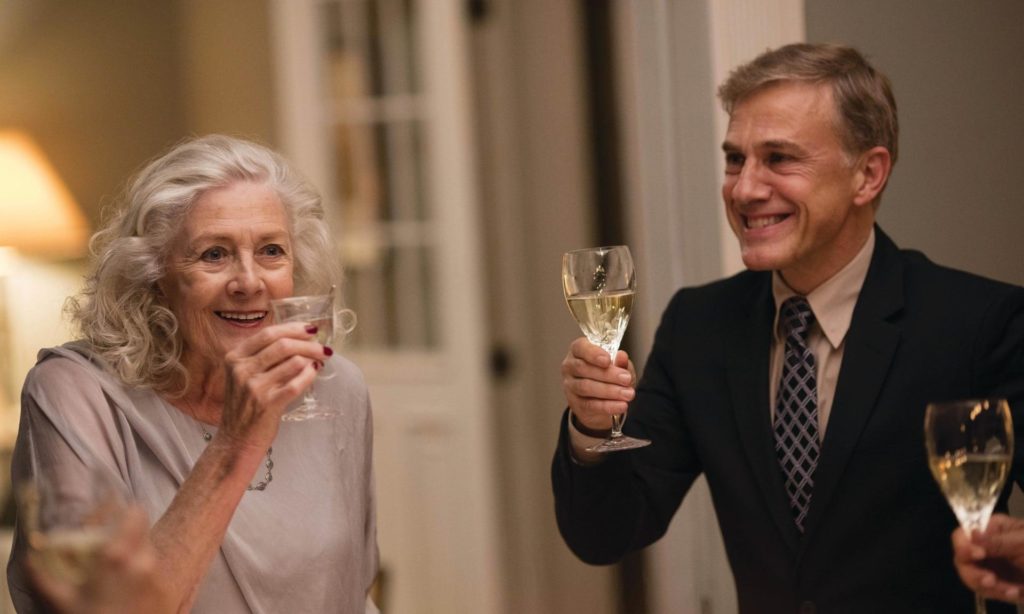Capsule reviews for May 14

Vanessa Redgrave and Christoph Waltz star in GEORGETOWN. (Photo: Paramount)
The Djinn
Although the concept outweighs the payoff, this atmospheric low-budget horror movie marks a promising debut for the director tandem of David Charbonier and Justin Powell. It’s set in 1989, when a young mute boy (Ezra Jacobs) lives with his single father (Rob Brownstein) after their mother left under mysterious circumstances. When dad is working one night, he finds a book of spells and rituals, one of which claims to grant wishes but instead traps the youngster with a supernatural presence known as the Djinn. In this unsettling exploration of adolescent insecurities, clever visual flourishes and Jacobs’ expressive performance help build enough suspense to overcome child-in-peril cliches. (Rated R, 81 minutes).
Georgetown
The ambition exceeds the grasp of this uneven directorial debut from actor Christoph Waltz, which struggles to maintain its satirical edge amid tonal inconsistencies. Waltz stars as Ulrich, a smooth-talking social climber who marries a widowed socialite, Elsa (Vanessa Redgrave), with Washington political connections. His ulterior motives are clear to Elsa’s daughter (Annette Bening), which causes friction as Ulrich infiltrates diplomatic circles. Then when Elsa is found dead, she suspects foul play. Inspired by a true story, the film isn’t intriguing enough as a murder mystery and not sophisticated enough as an insider expose, leaving Ulrich as a fascinating character in need of a better movie. (Rated R, 99 minutes).
High Ground
While showcasing the beauty of its remote landscapes, this gut-wrenching Australian drama depicts the ugliness of colonialism and systemic racism. Specifically, it’s set in the Outback during the 1930s. Gutjuk (Jacob Junior Nayinggul) is a young Aboriginal man who survived a massacre as a child and was taken in by an ex-soldier (Simon Baker) and his family. Years later, Gutjuk’s heritage is threatened again when his outlaw uncle is targeted, and he’s unsure who he can trust. The well-acted, multilayered story provides a history lesson that resonates powerfully today. With the film’s brutal violence and rampant xenophobia, it’s difficult to watch but even harder to dismiss. (Not rated, 104 minutes).
The Killing of Two Lovers
The title doesn’t tell the whole story in this searing low-budget character study about a crumbling small-town marriage. Putting a fresh spin on familiar themes, the film follows David (Clayne Crawford), whose wife (Sepideh Moafi) has started seeing another man (Chris Coy) while their separation plays out. David struggles to keep it together, especially when access to his four children is restricted, and considers violent revenge. Although some technical trickery proves distracting, director Robert Machoian’s tightly focused and sharply observed screenplay — favoring long scenes and nonlinear structure — builds suspense and emotional depth without compromising authenticity. Crawford’s understated performance is captivating, while the atmosphere is appropriately unsettling. (Not rated, 85 minutes).
Profile
More of a filmmaking experiment than a pulse-pounding thriller, this cautionary tale about online terrorist recruitment is depicted entirely on smartphone and laptop screens. It chronicles an undercover British journalist (Valerie Kane) looking to expose an Islamic militant extremist (Shazad Latif) over social media before being drawn in by radical propaganda that tests her beliefs and her loyalties. Examining the reality that online danger is only a click away, the structural gimmick used previously in Unfriended and Searching is handled reasonably well by Kazakh filmmaker Timur Bekmambetov (Ben-Hur). Yet considering the narrative ambition and the topical subject matter, the result winds up more tedious than provocative. (Rated R, 105 minutes).
Riders of Justice
Mads Mikkelsen’s intense performances galvanizes this offbeat Danish thriller that’s mostly about brutal revenge but also is amusing and heartwarming beneath the surface. Mikkelsen plays Markus, a soldier who returns from overseas after his wife dies in an apparent train accident that spared his teenage daughter (Andrea Heick Gadeberg). His grief turns to anger when a quirky mathematician (Nikolaj Lie Kaas), who also was a surviving passenger, shows up claiming to have evidence of foul play. The screenplay by director Anders Thomas Jensen (Men and Chicken) effectively juggles tones and bits of misdirection, finding fresh ways to explore familiar themes. It’s somehow both silly and suspenseful. (Not rated, 116 minutes).